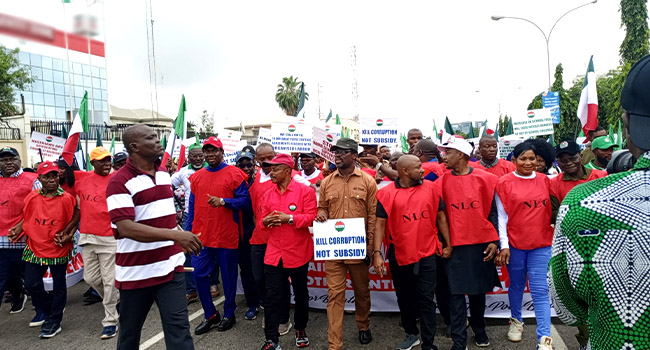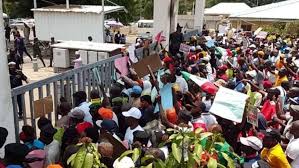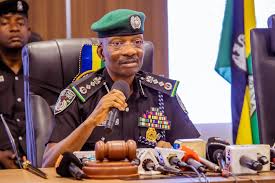
Labour suspends strike, OPS, stakeholders tackle NLC, TUC
The national executive councils of the Nigeria Labour Congress and the Trade Union Congress on Wednesday night suspended their nationwide strike over an alleged assault on the President of the NLC, Joe Ajaero.
The unions said the suspension followed the intervention of the National Security Adviser, Nuhu Ribadu.
However, the organised Private Sector and the maritime operators carpeted the NLC and TUC over the industrial action, stating that it was ill-timed and misconceived.
The OPS comprising critical players in the economy noted that the strike would affect the Federal Government’s ability to meet its yearly revenue target.
Our correspondent gathered that the organised Labour meeting which commenced a few minutes past 7pm lasted for close to one hour during which various affiliates and state chapters reviewed the outcome of the meeting held between the leaders of the organized Labour and the NSA.
The National Deputy President of the TUC, Tommy Etim, explained that the strike was suspended based on the trust the unions had in Ribadu.
“The NECs of the NLC and the TUC have suspended the strike. We did this based on our trust in the National Security Adviser, Nuhu Ribadu who gave us his word. We also saw that he wasn’t playing politics with our demands and he was ready and promised to follow up with everything.”
Asked whether the suspension of the strike was indefinite, Etim said, “It is a temporary suspension. We are going to give them some time after which we will meet and if they fail to meet up, the strike resumes.
“We listened to the NSA and he listened to us. He noted that Ajaero didn’t do anything wrong by going to Imo State. We must commend the NSA and it is because of him that there is a suspension of the strike.”
The labour leaders had earlier on Wednesday met with the NSA who announced the arrest of two suspected involved in the attack in Owerri, Imo State on November 1.
The NSA revealed this during a meeting with labour leaders in Abuja on Wednesday- the second day of the strike.
He also apologised to the organised labour over the attack on the NLC president.
Ajaero, who stormed Owerri to lead a protest over unpaid salaries to government employees in Imo State, was beaten by hoodlums and allegedly detained for hours by the police in the state.
Consequently, the labour movement gave the Federal Government an ultimatum to arrest the perpetrators among other demands, to avoid a strike.
To prevent the labour action, the Federal Government secured a restraining order against the unions at the National Industrial Court but the labour leadership mobilised the workers for the strike which commenced on Tuesday.
NSA begs Labour
In a statement signed by the Head of Strategic Communications in the Office of the NSA, Zakari Mijinyawa, issued after their meeting, the NSA urged the unions to rescind their decisions on the strike.
Ribadu noted that the Federal Government regretted the incident that happened in Imo and condemned it in its entirety, adding that it was against the rule of law and the principles of freedom of association and expression subscribed to by President Bola Tinubu and his administration.
“The Office of the National Security Adviser is concerned by the declaration of a nationwide strike by the leadership of the Organised Labour led by the NLC and TUC.
“The NSA is particularly worried about the implications of the strike action on the livelihood of ordinary Nigerians and its potential impact on economic security and other strategic national interests.
“As attested by the NLC leadership, the NSA immediately intervened on learning about the travails of the President of the Nigerian Labour Congress, Comrade Joseph Ajero who was assaulted in Owerri, Imo State.
“The NSA regrets the incident and condemns it in its entirety as it was against the rule of law and the principles of freedom of association and expression subscribed to by President Bola Ahmed Tinubu and his administration.
“The Federal Government will never condone such an act. As fallout of the incident, relevant authorities were directed to conduct a thorough investigation into the circumstances surrounding the assault and bring to book the culprits. An available update indicates that some arrests have already been made in this regard. The outcome of the investigation will be made public as soon as it is concluded.
“The Federal Government, through the Office of the NSA, therefore, appeals to the labour leadership to call off the current strike action and allow the dialogue process underway to be exhausted.”
Already, the Minister of Labour and Employment, Simon Lalong, has expressed optimism that the industrial action would soon be called off.
Giving an insight into the parley with the NSA, the Deputy President of the TUC, Etim, said that the NSA also briefed the leadership of the organized Labour on the steps taken so far in implementing the demands of the labour unions.
He also noted that the union leaders secured the commitment of the NSA, adding that the union leaders were satisfied with the steps taken so far by the government.
Meanwhile, the NLC has listed six demands that must be met before labour unions before it can call off the strike indefinitely.
It listed the six conditions in a post via its official X handle (formerly known as Twitter) on Tuesday.
The NLC said a special adviser to the Imo governor on special duties who allegedly led the attack on the NLC president and other workers in the state must be arrested and prosecuted.
The union also said all police officers as well as thugs involved in the attack on the labour leader should be arrested, prosecuted, and dismissed.
Ruing the costs of the strike on the economy, the OPS noted that the strike was coming at a time when the naira was struggling to stabilise.
On his part, the Deputy-President of the Lagos Chamber of Commerce and Industry, Gabriel Idahosa, described the decision of the organised labour to go on strike over an assault on the NLC President as an abuse of power.
He said, it is self-serving for labour to shut down the national economy merely because of an assault on the president of the labour union.
“It is unfortunate that labour unions in Nigeria have degenerated to the kind of self-seeking impunity that the functionaries of government are always accused of being guilty of.
“Because an individual is assaulted, then the economy of a country is shut down; it doesn’t make sense. It doesn’t matter who the individual is, even if it was the president of the country, he is still an individual. So, labour thinks that because it has the power to go on strike, any reason is sufficient to exercise that power.’’
Exchange rate
A facilitator with the Nigerian Economic Summit Group, Dr Ikenna Nwosu, said, “For me, the impact is coming at a very bad time when the exchange rate is trying to find its way back to some level of stability; that is the worst part of it. So, it is coming at that good time when the currency is about stabilising.”
Nwosu added that the strike would affect the government’s ability to meet its yearly revenue target.
“Secondly, it is also going to affect the ability of the government to meet its revenue target. They are losing money, the ports are closed and ships can’t berth to offload their cargoes.’’
The National Vice Chairman of the Nigerian Association of Small-Scale Industrialists, Segun Kuti-George, disclosed that businesses were already feeling the shocks of the strike.
“There is already difficulty in transportation hindering workers from reaching their workplaces. This, in turn, is expected to lead to a decline in productivity, potentially affecting both small and large businesses,’’ he pointed out.
Kuti-George emphasized the need to understand the situation and acknowledge the complexities at play.
The strike, according to him, posed a tough situation that demanded careful consideration and resolution.
The President of the West Africa Specialty Coffee Association, Larry Segun-Lean expressed the uncertainties faced by the union members due to the strike.
While recognising the unions’ right to strike, he questioned the timing, stating that not every situation warrants such an action.
Segun-Lean urged the NLC to consider the broader issues affecting the economy and advocated a strategic approach.
N20bn lost
Two days into the strike, licensed customs agents operating in the nation’s maritime sector, said that the country had lost between N10bn to N20bn following the lockdown of the ports by the Maritime Workers Unions of Nigeria.
One of our correspondents observed that as of Wednesday, access to Apapa and Tin Can Island Ports was restricted as workers were denied entry into the facilities.
Giving an update on the development, the Deputy National President of the National Association of Government Approved Freight Forwarders, Mr Nnadi Ugochukwu said, “The country is losing and the individuals are also losing. I have a customer here who was supposed to take delivery of his vehicles yesterday (Tuesday) but he couldn’t, having to pay demurrage of about N500,000 on a car for two weeks.
“He is paying N30,000 daily. He had paid today (Wednesday





